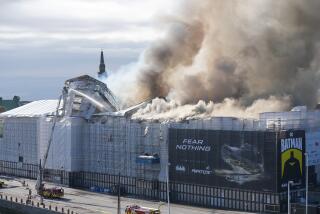Border Watchers See New Threat
Mexican military personnel illegally crossed the border last month and aided Mexican drug traffickers pursued by the U.S. Border Patrol, a law enforcement official and the head of the Border Patrol union told a congressional hearing Tuesday.
The Jan. 23 incident involving U.S. agents and heavily armed drug traffickers in military uniforms shows how dangerous efforts to secure America’s border with Mexico have become, agents and federal officials told the House Homeland Security subcommittee on investigations.
They urged lawmakers to take immediate action against emboldened cartels -- which they contended were supported by Mexican authorities, private militias or both -- or risk increasingly violent border conflicts.
Last month’s incident, 50 miles east of El Paso, follows six similar incursions by uniformed men in the last four months, including one in Southern California.
“It would not take much for one of these standoffs to turn violent and to turn deadly,” said Rep. Michael McCaul (R-Texas), the subcommittee chairman.
Late Tuesday afternoon, Mexico’s Ministry of Foreign Affairs issued a statement about the Jan. 23 incident, saying that the country’s military units did not have the type of weapons or vehicles described by U.S. authorities, and that cartels frequently used military uniforms and weapons. That statement repeated Friday’s assertion by the Mexican defense minister that the traffickers were most likely linked to a cartel in the northern Mexican state of Chihuahua.
The chief of the U.S. Border Patrol, David V. Aguilar, told the lawmakers that the United States did not have proof that the people in military uniforms were Mexican soldiers, but added that nothing had been ruled out.
“If they weren’t Mexican military, why is Mexico just sitting back and allowing this to happen?” said T.J. Bonner, president of the National Border Patrol Council, a 10,500-member union of Border Patrol agents. He decried what he called a “culture of corruption” that he said allowed cartels to operate freely along the border by bribing Mexican authorities.
Esequiel Legarreta, deputy sheriff of Hudspeth County, Texas, described seeing a military-style Humvee with a .50-caliber machine gun at the border Jan. 23 as U.S. agents pursued three sport utility vehicles across the Rio Grande into Mexico.
Video footage showed that after one SUV became stuck in the river, the Humvee tried to tow it before unloading bundles of suspected marijuana and setting the vehicle ablaze. Another SUV, found with 1,400 pounds of marijuana, was abandoned after it blew a tire on the U.S. side of the border.
Aguilar offered separate video of incidents in Arizona and California in which Border Patrol agents and their vehicles were struck by large rocks thrown over a security fence.
Hudspeth County Sheriff Arvin West warned that inaction could prompt even more daring raids by smugglers. “It is just a matter of time that the drug cartels will wire their drug loads with explosives and, when caught by law enforcement personnel, detonate the load vehicle,” he said.
The threats of escalating border violence come as the Bush administration is proposing a temporary-worker program, which the White House believes would allow the Department of Homeland Security to focus on more serious border threats. Some House Republicans say they will support such a program only after the border is secured.
West warned that the issue was larger than illegal immigration. “If drug cartels can solicit untrained people to drive across the border undetected and enter this country with illicit products, then what can a well-trained terrorist do?” he said.
West also said that if the government failed to provide additional manpower and funding, local law enforcement would have a harder time preventing “irate citizens” from forming vigilante militias.
In the fiscal year 2007 budget released Monday, the Bush administration proposed adding $1.7 billion in border security funding and hiring 1,500 more Border Patrol agents.
More to Read
Start your day right
Sign up for Essential California for news, features and recommendations from the L.A. Times and beyond in your inbox six days a week.
You may occasionally receive promotional content from the Los Angeles Times.






